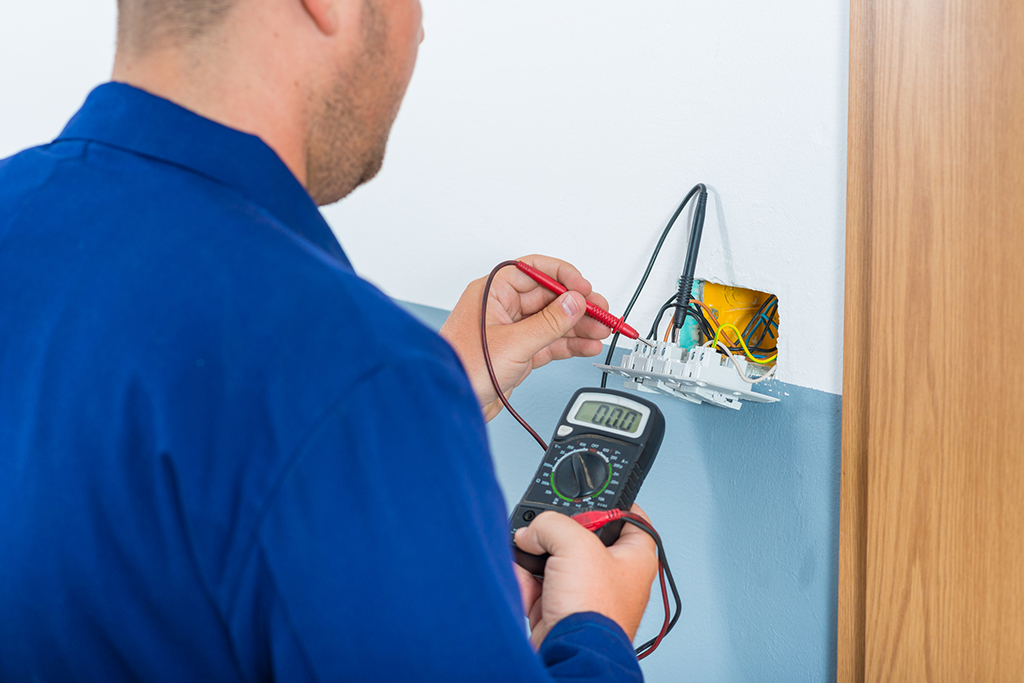
When Is It Time to Have an Electrician Inspect Your Home’s Electrical System? | Myrtle Beach, SC
Photo By GregorBister at istock
The Electrical Safety Foundation recommends you have your home electrical system inspected if your home is more than 40 years old. They also recommend having your home inspected each time you install any new major appliance. You should also have your home inspected if you are planning to have your home renovated or remodeled. If you have moved into a new home, it is vital you have your new home electrical system inspected. While you can do some simple checkups of your home’s electrical system yourself, it is wiser to choose to consult with a professional when it comes to the safety of your home and family. A licensed electrician should inspect your home yearly to ensure your home’s electrical system matches the safety provisions set forth by the National Electrical Code (NEC).
You might be savvy enough to know water and electricity don’t mix, and how to flip a breaker, but do you know the difference between GFCI and AFCI outlets? Do you know what whole-house surge protection is? There is a lot about your home’s electrical system you probably don’t know. Knowledge about your home’s electricity is power, pun intended!
Each and every year hundreds of needless deaths, thousands of injuries, and billions of dollars worth of damage occur due to lack of basic electrical safety knowledge. The kind of knowledge only a professional can provide. Do not become part of this grim statistic, the safety of your home and family may well depend on having a basic routine inspection of your home’s electrical system. Even simple parts of your home system can be deadly, for example, Electrical outlets/receptacles cause 5300 home fires and over 40 deaths every year. Even locally fires result from electrical system failure.
While an inspection is not mandatory when purchasing or remodeling a home, it can uncover issues before they become a problem, problems that can lead to injury, death, or property damage.
What Is Included in an Electrical Safety Inspection?
Your professional will inspect your outlets/receptacles, GFCIs and AFCIs, wiring and circuits, switches, outdoor wiring, and even your HVAC wiring. Good professionals will also check your smoke and CO detectors. They will find anything that could put you or your home at risk of a fire.
Check Power Sources
Your home’s power sources need to be inspected every year. These include light switches, outlets, appliance cords, and ground fault circuit interrupters. Something as simple as a loose outlet can lead to a fire. If one of your outlets has black residue around it or heats up, this indicates a fire hazard that must be addressed immediately by an experienced electrician. If you hear humming or arcing sounds made by lighting fixtures or outlets, it is time to call an Electrician.
Your Homes Wet Areas
GFCIs are a must for all wet areas of the home such as kitchens and bathrooms. All of your exterior outlets also require GFCIs. Your GFCIs should be tested yearly to ensure there is no fire hazard. Your light switches should also be a safe distance away from water.
Electrical Service Panel
Your Electrical Service Panel is often located in either the basement, garage, or along the exterior of your home. Your panel if older will contain fuses if newer will contain circuit breakers. Your licensed electrician will inspect your panel for wear and tear, wire corrosion, and other signs of failure such as smoky or black residues. If your panel uses fuses it should be upgraded to one with circuit breakers. If your panel is rusty or damaged it should be replaced altogether.
Replace Older Wiring
If your home is an older home chances are you have outdated wiring. You may think just because a home is 30 years old or older that the wiring is safe because the home hasn’t burned down yet. Yet older homes may contain wiring that by today’s standards is dangerous. Take homes built before 1950 for example. These homes tend to have very old knob-and-tube wiring. knob-and-tube wiring is covered in a material that often by today’s date has degraded, leaving the wiring degraded or even bare, which is a fire hazard. Homes built between 1965 and 1973 often have aluminum wiring which has substandard performance and safety qualities. Both types of outdated wiring can make it difficult to ensure your home, at the least it can jack up your insurance bill. Your local Myrtle Beach, SC Electrician can replace these dangerous older wiring systems with safe updated wiring, giving you peace of mind.
If buying a home
If you are buying a new home, chances are you are having it inspected by a home inspector prior to purchasing it. While home inspectors are trained to identify a number of electrical issues, a licensed electrician can provide the peace of mind only an electrician’s expertise can provide for an electrical home inspection.
Keeping Your Home’s Wiring Safe and Up to Code
You want to ensure that your home’s wiring is up to code and up to date. Older wiring systems are no longer used for a reason, and that reason is fire safety. Each year thousands of fires are caused by outdated wiring. The National Fire Prevention Association says that faulty wiring also known as electrical distribution is the fourth leading cause of home fires. Having your home inspected by an electrician at least once can help you to avoid being part of this statistic.
What Is the National Electric Code?
The National Electric Code (NEC) establishes the benchmark for electrical systems. Just since 2017 alone, the NEC has been revised 15 times. This means that just because the wiring in your home that was deemed safe just years ago may no longer be considered safe. A local Electrician can ensure your home’s wiring is safe and up to code.
If you are in doubt about your home’s fire safety due to your electrical system, call Mister Sparky of Myrtle Beach, SC, today for a consultation for custom electrical work by calling 843-213-6610.

